Far Away Eyes’ Deeper Look: “Supernatural” 10.11 “There’s No Place Like Home”
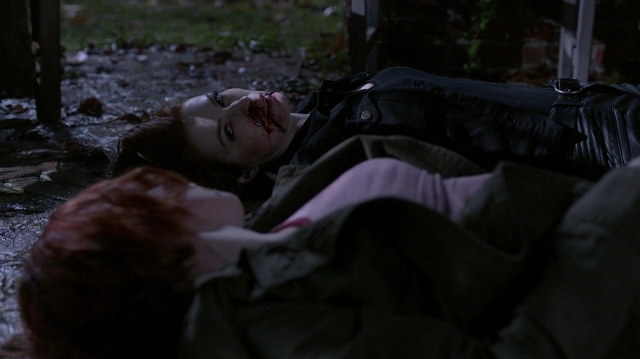
In “The Hunter Games,” we were shown the truth about powerful forces. We learned that our humanity is a force to be used against the monster within—or in Dean’s case the Mark of Cain. In “There’s No Place Like Home,” we learn that it’s more than the inner battle being fought—it’s how and what the end result of that battle will be. At the end, Sam asked Charlie how she was feeling, and she replied, “Good? Bad? I think I’ll settle for balanced.” Balanced. While our humanity may be a powerful force that contends with our monster within, it is the balance between the two that will make it possible to succeed—or in Dean’s case to overcome a force such as the Mark of Cain.
What does it mean to be balanced? The word is all over our language. We balance our accounts. We eat balanced diets. We try to have a work/home life balance. We want to be mentally and emotionally balanced. But what does it mean in the overall scheme? And once we achieve it, how do we maintain it?
To be balanced is to have reached an equilibrium. It means that everything is even. Mentally and emotionally, it means that we’ve achieved a calm and that we practice good judgment. It might even mean that we’ve managed to find inner peace.
“There’s No Place Like Home” shows us just how this equilibrium can be disrupted on several layers—through metaphor and reflection.
First, let’s look at Dark Charlie and Good Charlie.
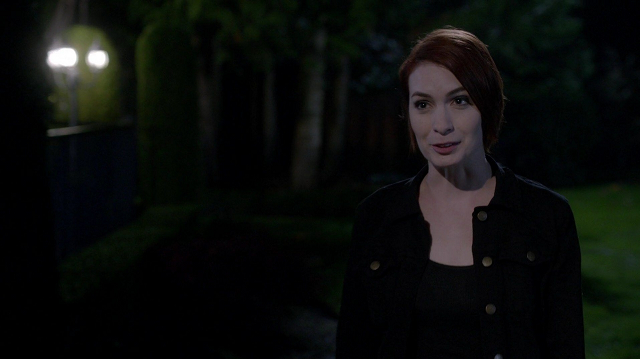
We meet Dark Charlie whilst she’s torturing a man. She’s cold and calculating in her assault of him, going so far as to taunt him from the shadows when he thinks he may have managed to escape her wrath. She steps into the bright security lights, and tells him frankly, “Who doesn’t love a little torture?”
The Winchesters see the feed of what happened next, and they watch Charlie beat violently on this individual. It’s brutal and messy—and it certainly isn’t like the Charlie they’ve come to know through the years. After all, Dean describes her as someone who “wouldn’t harm a Hobbit, practically sparkles?” As they figure out why she was at this man’s home and what led to this beating, they follow her footsteps. There, they get the same information from the man to head to a council woman’s home.
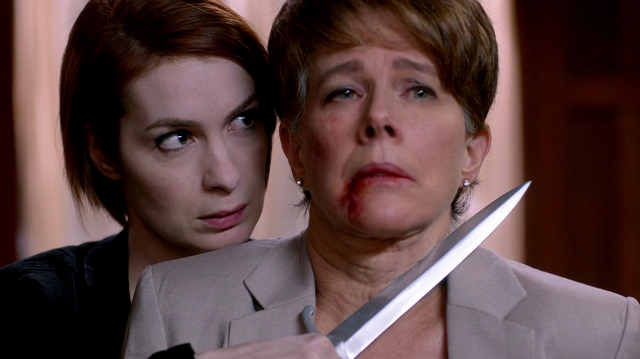
There, they see Dark Charlie in her dark glory. She is vindictive and cruel to her hostage and to the brothers as they have to face her wrath and grief. She says to them, “Oh Sam, you’re adorable. You’re not gonna hurt me, in fact that’s your problem. All good guy code no bite, what a waste. And you, always letting this albatross hold you back. ”
After she manages to take Dean by surprise with her fighting skill, she flees. The brothers will have to chase her down in order to stop her from either returning or finding her next target. Unfortunately, as Dean rushes to the Impala, he discovers that the tires were slashed, preventing them from chasing her down.
After they learn that she’s merely one half of Charlie—after being split by the Inner Key of Oz—Sam and Dean split up. One will keep searching for Dark Charlie to stop her from doing more harm and the other will help Good Charlie with research to fix the problem all together.
Pairing Dean with Dark Charlie and Sam with Good Charlie gives us an opportunity to see first hand how not only is balance necessary but that too much of one side or the other is a problem. It also gives us a chance to see the reflection in their stories and how it both compliments and contrasts them.
In every encounter Dean has with Dark Charlie, he is encountering yet another mouth piece of the Mark of Cain. She tells him precisely what he wants to hear—or what it thinks he ought to hear in relation to giving into this portion of himself. She tells him, “You know what I learned about being dark? It sets you free. And part of you know that’s right, too.”
Earlier in the season, we saw Dean feel much the same way while still demonic. It was easier. Everything was in black and white. Here, however, Dark Charlie goes as far as to say that there’s no such thing as good or bad. “There’s just us and them.” It’s not hard to imagine that the Mark itself has whispered this to Dean repeatedly since he was cured. It’s easy to see that it would want him to give into this. After all, part of its allure is its false balance. Demon Dean, after all, described himself as being part of the Natural Order. Nothing says balance more than the Natural Order—and yet we know that both Demonic Dean and the Mark of Cain are false, and that they will tell lies in order to convince others to fall for their falseness.
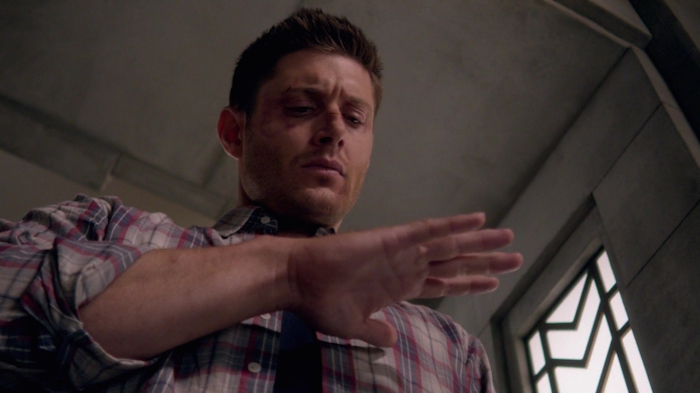
We see Dean waver throughout the episode. His hand shakes when they pack to track Charlie down, he has a faraway look as he gives into its relentless whispering. We see it in how he brutally questions Dark Charlie’s second victim, demanding forcefully that he give up a name—almost finishing where she started. And we see it in the way he toys with the little sword Dark Charlie hands over. It starts to take over so much so in that moment that he is too slow to react when Dark Charlie slams the door shut on him. Dean stares into a mirror, too, glimpsing in his own expression how he’s teetering towards giving in to this darkness. Dark Charlie is the metaphor for giving into the Mark—and disrupting the very balance Dean is trying to achieve within himself.
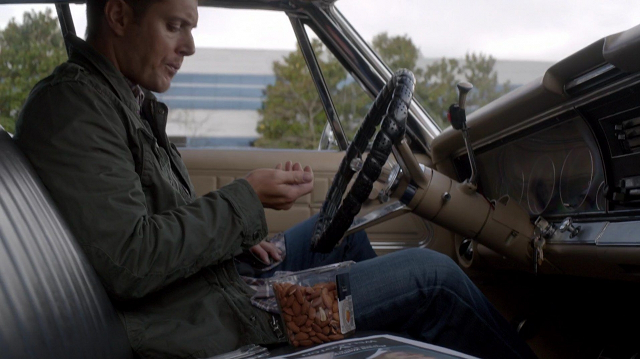
We see him try to achieve balance through his eating of egg white omelets—even if he declares them to be crap. He’s eating kale, even if he isn’t sure he knows what it is. He has stopped drinking. He’s sleeping for at least eight hours each night. He’s even going as far as to listen to self help tapes on meditation—-to mind his quiet! Dean is trying desperately to find balance within himself to quiet the whispers of the Mark of Cain. No matter how far out of his comfort zone it seems, Dean is willing to try it at least once. As much as it is about quieting the Mark’s whispers, it’s also about finding some semblance of control when Dean feels he is losing so much of it.
And yet he’s confronted directly with another outward manifestation and metaphor that speaks loudly for it.
Dark Charlie represents so much more, however. She may represent the Mark of Cain, but she’s also a clear example of what imbalance looks like. Too much of our monster within and none of our humanity makes her chaotic. She represents our id, our ambitions, our survival instincts, our anger, our hatred, and a multitude of our other negative emotions. She’s everything that we try to repress in our civilized world.
And, most importantly, she shows us just how dangerous bottling that portion of ourselves up can be.
Dark Charlie’s actions show us this clearly as she exacts revenge on those involved with the drunk driving case surrounding the death of her parents. It’s as if the whole Charlie had imagined doing these very things—tracking these people down and exacting some form of justice on them after the justice system failed her—but didn’t due to better judgments. The whole Charlie knew this wasn’t the answer—and despite her psychological file listing her as having “Anti-authority disorder, clinical depression, [and] violent outbursts,” she seemingly never pursued this path. It doesn’t mean, however, that this wasn’t a buried fantasy—one that Dark Charlie has no problem exploring to its final and violent conclusions.
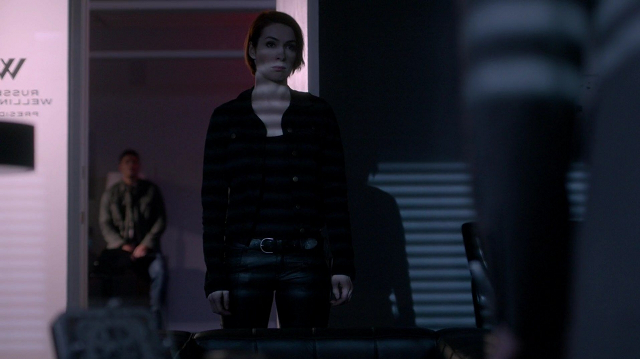
In that regard, Dark Charlie is our grief manifested in an angry and violent manner. This is crystal when we see her talk with Wellington, telling him, “You took everything from me.” It’s in the tone of her voice and the broken expression on her face. Dark Charlie may enjoy beating on those that stand in her way, she may enjoy torture, she may indulge in saying cruel things, but underneath it she’s the grief stricken girl Charlie’s tried to run from since the accident happened.
This grief, then, isn’t as much about Dean’s story as it is about Sam’s. Sam did some of the same things in his search for Dean. He tortured a crossroad’s demon for information. He ended up in violent disagreements with other hunters, and he did convince another person to summon a demon—all in the hopes of finding his missing but dead brother. It’s something that we’ve seen touched upon throughout various episodes with various degrees. Sam’s drive to save his brother, however, goes further back than Metatron’s vicious stabbing of Dean—or Dean’s stint as a demon leaving a distraught Sam to search for him.
We see this grief rooted in an earlier incident surrounding Dean’s deal and Sam’s inability to stop it. We see this grief rooted in the haunting and traumatic experience of the “Mystery Spot,” and we see it in the moment Dean was taken from him brutally by the hell hounds in “No Rest for the Wicked.” Dark Charlie’s grief, then, reflects much of Sam’s struggles with the grief that’s haunted him since then—as it boiled for years in Charlie it so too has boiled inside Sam rather he’s aware of it or not.
And then there’s Good Charlie.
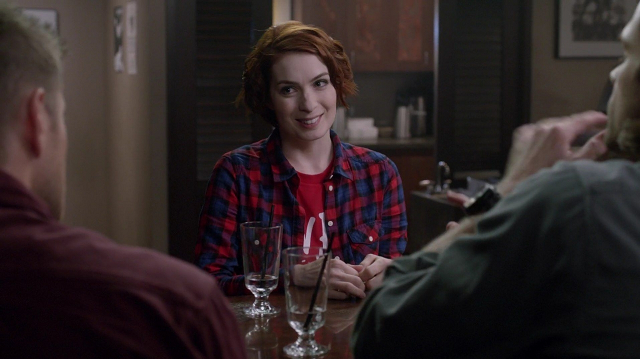
If Dark Charlie represented our repressed feelings or desires—or our ultimate buried grief, Good Charlie gives our humanity a voice. She is kind and sweet. Instead of hitting on the bartender as she would like to do, she is content with sipping on club soda “and wanting to send her to college.” Good Charlie doesn’t lie. She doesn’t steal. When Sam tells her that they’ll need her to hack into the bank accounts of the council woman to trace the money, she tells him she can’t—followed up by the statement that “being good is annoying.”
We’re told to be good. We’re told to follow the golden rule. It’s the right thing to do, after all. And yet, if we’re only good we are easily taken advantage of or we lack ambition. Being only our good side leaves us open and vulnerable and can hamper our survival rate. It can make us indecisive or slow to take action. If we were to truly face an imbalance of this kind, we’d find ourselves unable to do much so afraid that we’d harm someone else.
To be this good is to be as chaotic as to be our id selves. It’s an imbalance that will not and cannot stand in the long haul.
What Good Charlie is telling us about the overall story is that while we should champion our humanity and try to be good people, we cannot let it be in total control anymore than we can allow our “darker” sides free reign.
In fact, to fight for our humanity, we will need our darker traits in order to win. As ugly as these traits can be, they are essential for our progression as individuals and as a species. Without ambition we will never take our compassion as far as it needs to go. Without some of our negative emotions—such as indignation—we may never stand up for what’s right when there’s wrong being done. Our darker selves—and the bad they can inflict on ourselves and others—can give us a perspective to know what’s right and wrong and to be able to recognize the difference. It can give us an understanding of the degrees to which they exist, too.
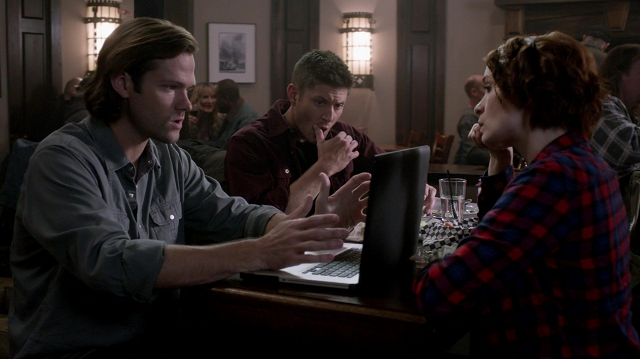
Good Charlie, for instance, will not hack the accounts because it’s a bad thing. It might lead them to stopping her Dark self from inflicting greater damage on others, but because it’s a “bad” thing, she refuses to do it, turning it over to Sam, instead. She recognizes that Clive is lying, calling him on his “bad” behavior, even if it might mean exposing him to danger. Our good selves, in this instance then, can cause more danger for us as we fail to see when “bad” behavior might actually lead to a greater good or save others from harm. It’s just as dangerous as giving into our darker selves and causing serious harm to appease the id.
And so, within this story we see a clear understanding of balance.
But how is this situation of the Dark Charlie and Good Charlie remedied? How do they put her back together and achieve the balance that is so obviously needed?
Sam and Good Charlie track down information about Clive Dixon, a former Men of Letters that retired. In his file, it’s stated that he had traveled to Oz and had been kidnapped. This incident led to Frank Baum traveling there after him—with Dorothy as the stowaway.
When they arrive at his place, Clive is going under a different name. He denies any knowledge about what they’re talking about, telling them that Oz is something to “best be left on the bookshelf.”
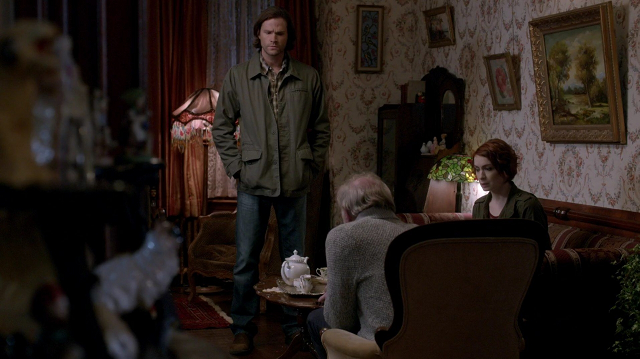
And yet, he possesses the identifying scar that marks him as being Clive, the same man that went to Oz. Upon seeing the broken key, he allows them to enter. Once inside, he tells them his story—filling in the blanks that the Men of Letters file simply neglected. He had been kidnapped by “bad people,”—witches to be exact. And what had happened to Charlie had been done to Clive, too. They had used the Inner Key of Oz, thus releasing his own id.
And the aftermath led to great imbalance and chaos. But it wasn’t as simple as that.
Clive’s dark side didn’t simply return to this world to exact revenge on those that had harmed him as Dark Charlie had done. Instead, he turned on the witches that had unleashed him and taken Oz for himself. Clive’s dark side became none other than the Wizard of Oz.
Without a working key, there was no way to reunite Dark and Good Charlie—or to stop the Wizard from turning on Dorothy in the aftermath of the War for Oz. It seemed that they had reached a brick wall, and that there was going to be a divided Charlie from now on.
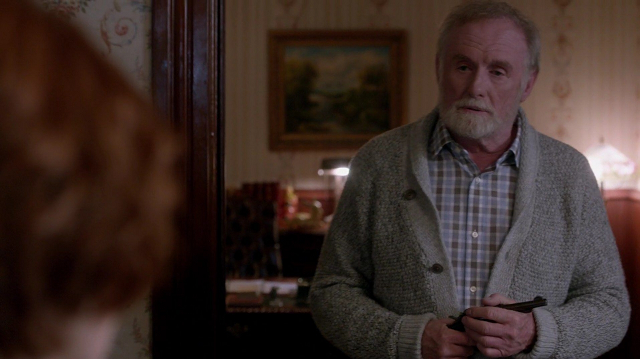
As the two sides were connected physically, however, Clive comes up with a drastic solution. He will take on a mortal wound and summon his id, the Wizard, here. It’s the only way they can get the Inner Key. It’s the only way to restore balance to both Clive and Charlie.
Meanwhile, Dark Charlie has followed Dean to Clive’s, hoping to prevent them from succeeding. While she wants Good Charlie to see things her way, she has no desire to be returned. The confrontation leads to another great example of how balance is necessary in order to overcome the monster within—especially for Dean burdened with the Mark of Cain.
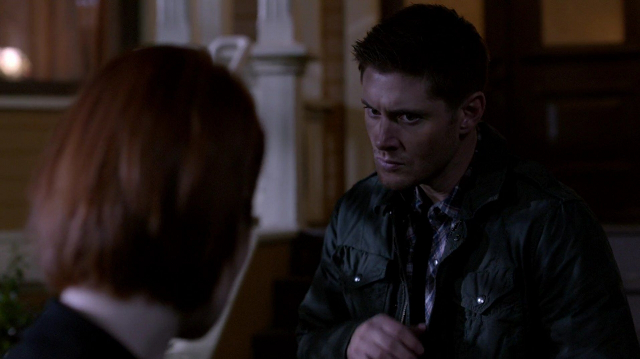
Dark Charlie engages in another fight with Dean, this time with the intent of getting through the elder Winchester and not merely fleeing him. She is cruel, telling him, “I learned it from you,” after Dean bars her way and declares, “You aren’t my friend.”
To stop her from “corrupting” Good Charlie, Dean punches Dark Charlie and the fight is on in earnest. Kicks and punches are exchanged. At first, it seems they might have an even match as Dark Charlie makes some calculated moves and strikes. She even manages to toss Dean aside a few times, making him tumble to the ground. The longer the fight drags on, however, it’s clear that Dean is quickly getting the upper hand.
And that is a danger to them both.
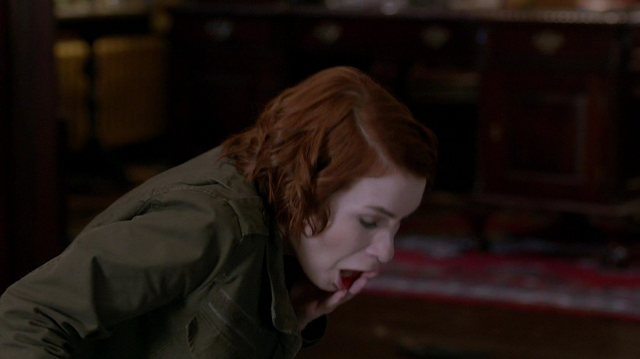
It is this moment that tests the elder Winchester and his resolve. After all, when faced with other confrontations recently, Dean has gone too far. He unleashed brutal murder when cornered in Randy’s house. He shot far too many times into Olivia. When goaded by Metatron in his drive for answers, Dean nearly murdered the angel. Each time has shown him tipping wildly into an imbalance that will make it much harder for him to ultimately resist the Mark or use the power of his humanity to overcome it.
But here? Dean must use restraint. He’s not merely beating on Dark Charlie. In another example of reflection, every hit and blow will also impact Good Charlie. His first strike—a punch to Dark Charlie’s mouth—ends up causing Good Charlie to gasp in shocking pain. As he punches and kicks, knocking her to the ground, each one lands just as harshly on Good Charlie—a rib, her chest, her legs, her back.
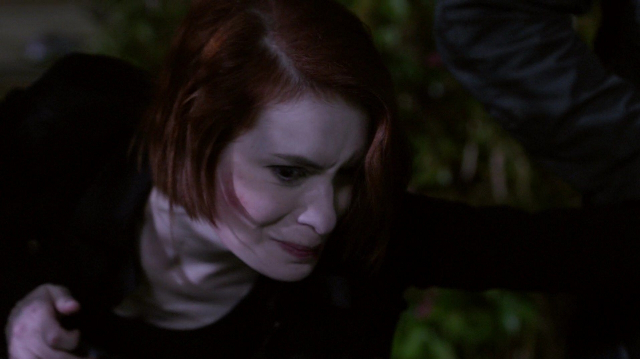
The longer the fight continues, we watch in horror as Dean starts to punish Dark Charlie. He manages to wrestle her to the ground, grab an arm, and twist until we can hear the distinct crack of bone. The same injury stuns Good Charlie.
And as she’s finally yielded, we see Dean slowly slip further into his imbalance as he viciously punches her face repeatedly. It isn’t until Sam can take Good Charlie outside and show him the mirrored injuries that have been inflicted on her that Dean can pull himself away from the haze and stop.
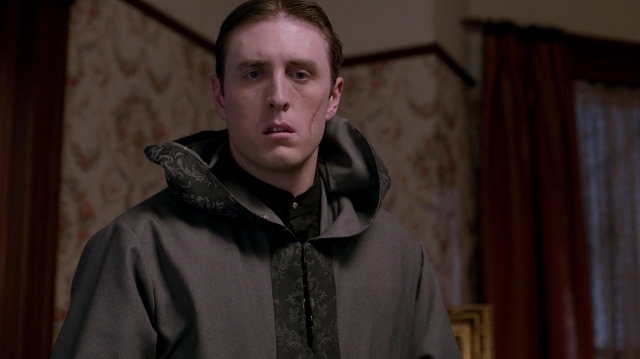
So, too, in Clive’s house do we see the mirror effect and the evidence of imbalance. Clive is the good side, wounded and helpless against his id, the Wizard of Oz. He is furious, telling Clive that he had one job to do: survive. To stop anyone from interfering with his attempt to save or take Clive back with him, he binds Sam magically. Good Charlie seems to be no threat to him—especially with her being brutally attacked by Dean’s fight with Dark Charlie. Instead, he will make his good self suffer some before restoring his health—and possibly taking him back to Oz with him.
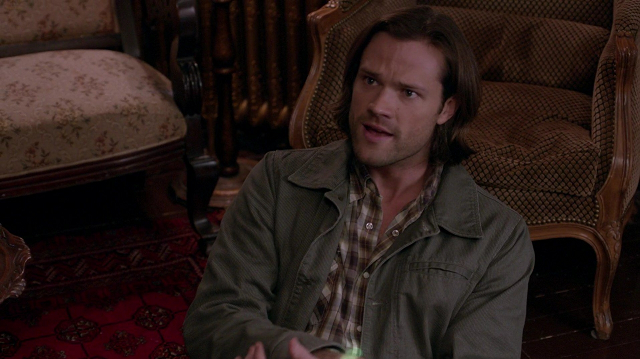
The imbalance of being all good rears its ugly head here as Good Charlie must now find a way to do something “bad” when she’s proven so far that she’s incapable of doing so. In contrast, we see Sam providing the example of being balanced—he is good, but he also possesses the darker traits that allow him to make difficult choices. Sam convinced her to help him hack the accounts. He’s the one that drew a weapon, and he’s the one that now begs the Wizard, “Let me help my friend!”
Turning his attentions only to Clive—and to Sam—is the Wizard’s big mistake. Good Charlie is forced to do something drastic to save not only herself—but another. It is in the saving of another that gives her the ability to do so at all. In many ways, it is also Sam’s courage and example that gives her the ability to follow through, too.
If she had been faced with this moment alone, it’s possible she may not have found the strength. Sam provided Good Charlie’s needed balance. It is his bravery and ability to stand against the Wizard of Oz, even when he’s magically bound, that gives Charlie the inspiration she needs. Sam didn’t think about himself here. Rather, he is fighting for everyone else in the room—and for the other half of Charlie he surely knows is nearby. It’s the kind of good that Good Charlie needed to witness to take the necessary actions.
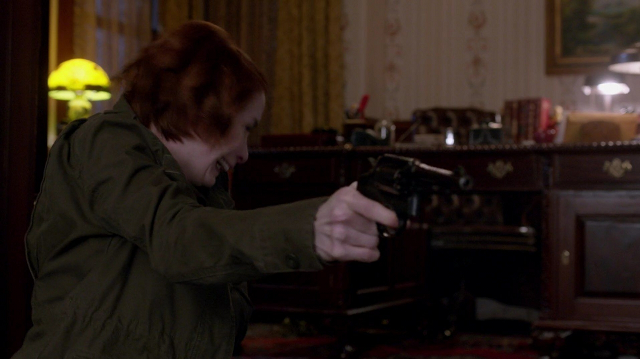
Now that it is Sam facing a life and death situation, Good Charlie must do what is good. The Wizard is going to kill him if she doesn’t—and so she has to follow through or be just as guilty of Sam’s death as the one causing it. This goes against the imbalance within her—but it also shows us the strength of humanity, too—when faced with such a drastic moment, her humanity is strong enough to face down this dark moment and rise to to overcome it.
As Clive pulled out the gun and explained his plan, “He is me and I am him. It’s the right thing to do after all.” Charlie must now finish what he started. The gun he used to wound himself is mere inches from grasp. And as the Wizard is taunting Sam—telling him that “heroes die”—before choking him and making him choke himself—Charlie has to pick it up and use it on an already dying Clive.
She whispers a heartfelt apology, and he responds, “I forgive you, we both do,” before Charlie can pull the trigger and stop the imbalance these two represented.
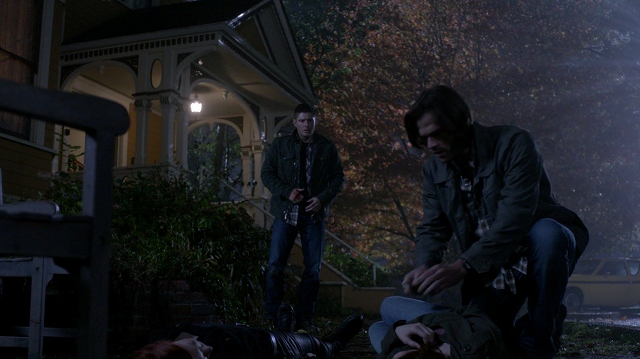
Once her battered body is laid next to Dark Charlie’s, we see Sam give her the Inner Key. It’s crucial that it is Sam that give her this key. He may not be the one that actually uses it, but he is the one that makes it possible here. If he hadn’t had the foresight to grab it from the Wizard’s body—while protecting Good Charlie in the aftermath of what happened—Dark Charlie may have managed another escape, making it impossible to fuse them back together. This is a great foreshadow that he will be Dean’s Inner Key—that it is Sam that will help Dean achieve and maintain the balance necessary to defeat the Mark of Cain.
Good Charlie uses the Inner Key and the two sides finally merged together—restoring the balance that had been so lacking in the two.
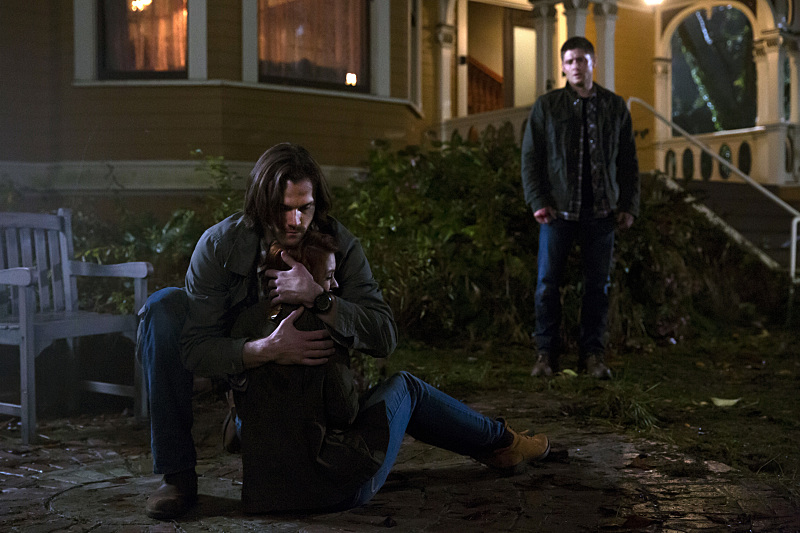
Once they’re reunited, Sam returns as her protector, holding her close and providing much needed reassurance. His support and presence allows her to reabsorb her Dark self—and everything that has happened since the two were thrown into this imbalance. Sam need not say a word here to lend her his strength. All he need do is console—understanding how difficult this truly is for Charlie after having enduring it himself in the past. After all, he had gone through it with his Soulless self. He, more than most, knows what she’s gone through, and so we see in this moment Sam provide her with all the comfort she requires.
In the aftermath, Charlie shows that all of her determination and grit—her dark side—and her heart and ability to love—her good side—have managed to find the equilibrium that makes her who she is fundamentally. She has the ambition Dark Charlie had in spades, telling Dean point blank, “We are going to fix this. I’m not letting what happened to me happen to you. ”
Dean isn’t so ready to believe this, retorting, “But it’s already happened.” And as shaky as he’s been on this case, the elder Winchester already fears that he’s losing even more ground to the imbalance the Mark of Cain is creating inside him. He feels guilty for what he’s done to Charlie—regardless if he was stopping her Dark self. He knows that Cain only achieved the ability to control the Mark “after centuries of murder.”
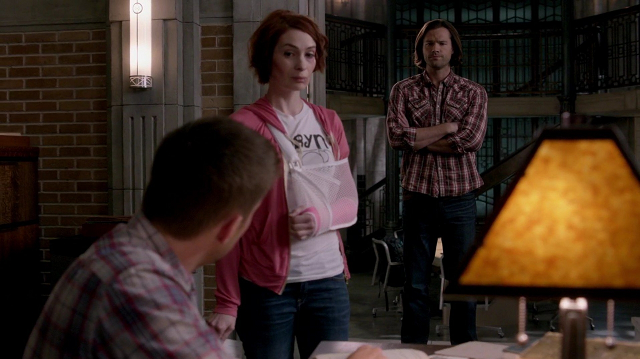
Charlie won’t hear any of this and tells him, with the heart Good Charlie had, “Yeah well, there’s one thing you have that he didn’t. You’re a Winchester.”
Tasked with finding a new lead on perhaps removing the Mark or at least helping Dean to find his own balance, Charlie is being sent to Italy to retrieve the ominously titled book, The Book of the Damned.
In the meantime, just how do Sam and Dean find their own balance? What lessons do they take from what happened to Charlie?
After she’s left, Sam turns to Dean and simply says, “She’s right, Dean. You can do this. We can do this.”
Perhaps the two of them as one united force is the only balance they really need.



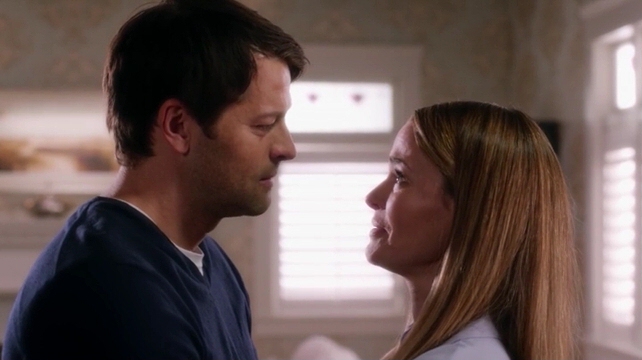
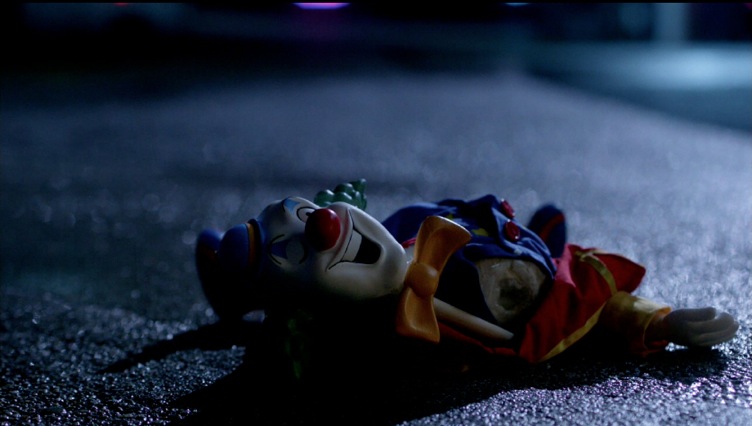
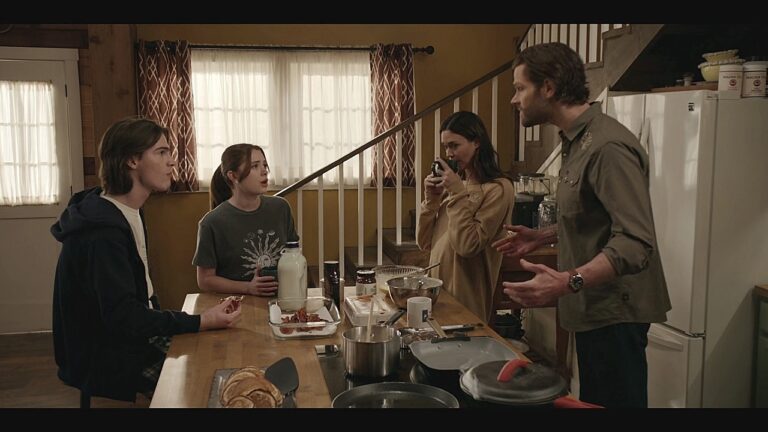
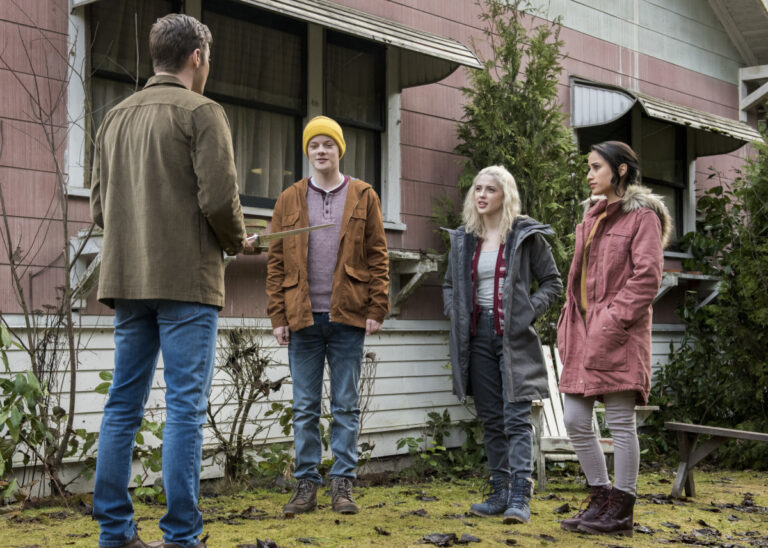
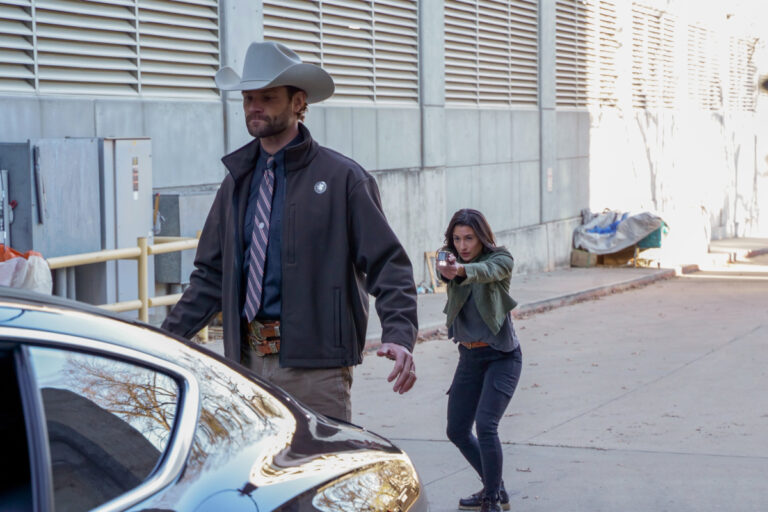
wonderful analysis in which I am in absolute agreement. I saw this eppy in the exact same way you did. I thought the message in this eppy was the “key” to helping dean maintain control of the mark until they rid him of it.
that message: forgiveness….first off sam epitomizes the very word. sam’s ability to forgive has always amazed me. it is a true testament to his strength of character. I believe it also a part of what helps us all maintain balance. it’s not only forgiving others, but forgiving oneself. now mind you sam has his issues of low self esteem and I still think he might even still see himself as a failure to his brother, which is why he will stop at nothing to save him…for fear of letting dean down again. this is sam’s monster. his inner demon…his lack of self worth that leads him to believe what is not at all true, that his brother is disappointed in him. but sam has a forgiving nature. he’s even been able to forgive himself. dean questioned sam once regarding sam’s ability to feel good, and sam responded that it was hell. hell punished sam both mentally, emotionally and physically…and it was the worst thing in the world, but if one to find a sliver of a silver lining in that, it was sam being able to let go…to forgive himself…to no longer punish himself…as he was already punished enough. but dean’s demon, his lack of self worth, his monster is a strong one as well. this monster is leading to dean’s destruction. dean’s lack of self worth has led to his inability to forgive himself. and this darkness inside dean is what the mark is feeding off of. it’s not enough to emulate sam’s eating habits…dean has to emulate sam’s ability to forgive as well…to let it go….. at least how I have interpreted it. 😉
sam is the key to dean being able to save himself. sam is his touchstone. sam is his strength. sam is his peace. I’ve said it on the threads, but I think what dean needs to do in order to start to conquer this darkness is apologize to sam. he’s never been able to do that. he’s apologized to kevin. but he still can’t bring himself to say the words to sam, although we know he is. I think that the reason he can’t say he’s sorry is the fear of having to face his inner demon…his monster…as to not what he did, but why he did it. to apologize to sam for his actions would have dean needing to come to terms with why he did it in the first place…he’d have to finally come face to face with the worst monster he’s ever had to deal with…himself. but if he can bring himself to apologize to sam, then he will be able to let go of all this guilt and anger he has for himself. as I said, sam has long forgiven dean….but dean needs to be reinforced with words….he needs to hear it,….his insecurities about himself necessitate confirmation..we’ve seen this before..like in the French mistake when he told sam that life in bizarre world wasn’t bad for him…sam reassured him then by saying no…they don’t mean the same thing..but more importantly he said…we’re not even brothers here…it’s just my strong belief that if dean tells sam he’s sorry for what he did and could come to terms to why he did it…sam would understand..he certainly will give him the affirmation he so needs assuring him that he forgives him and that there is nothing that will make sam love dean less or ever see him as a disappointment, which I feel dean doesn’t ever want to be to sam.
forgiveness I think is the key to dean letting go of his darkness that the moc is feeding on…..he needs to forgive himself. as simple as it sounds, it’s a daunting task for him. probably the most difficult thing he could ever do…but sam is right by his side. and it will be sam that provides dean with the strength and courage he needs to battle his monster within….
i’m not saying he’ll destroy it….like you said, we as humans are intentionally comprised of a dark side and a good side so as to balance ourselves out and keep us human….balance is all that is required and dean just needs to find that balance again.
jmo of course.
Thanks for the comment.
Yes, there was a lot of characters saying “I’m sorry” and “I forgive you” in this one. I think you’re onto something when you say that Sam has a great power to forgive. I’ve always seen that as one of the most beautiful things about his character. And it’s something I try to emulate in my own life. It’s one reason this show is so special to me and so many. Sam has always had this great gift and I think it’s going to be key for the season story in so many ways.
As for Dean, I think you’re right. Dean may have to make this act of contrition. He did tell Dark Charlie that he would pay for his sins and we have seen that he’s feeling guilty by his words and deeds. In some ways, he may see the MoC as his punishment for those sins. In order to beat it, he’ll have to take Sam’s forgiveness and forgive himself. I think it’s a great point you bring up on this.
Thanks again.
Your review and the visual one has risen to be the top articles I always wait from a week. I guess it is that in a way the focus is on something different. To something that doesn’t meet the eye at first glance.
Being balanced is the key and I really loved that Dean tried to cope the MoC in Sam manner or slightly mimic Sam with the healthy diet. But he is still not taking Sam’s greatest advantage and that is to move on. So he is not taking the thing that is most important from Sam. Dean keeps things inside and well, when Sam wants to talk about them Dean shuts off or makes it a joke. So I think the forgiveness is what there is missing. Not having it for himself is not really working for Dean.
Can’t wait for the next episode. 🙂
– Lilah
Thanks for the comment.
I’m so glad you feel that way about my articles! I’m sorry this one came a bit late, but hopefully the one for this week won’t take as long.
I was really struck by Charlie’s comment about being balanced and it went from there. I do think that Dean has to move forward in order to beat back the MoC. Perhaps the more he imitates his brother the more likely he’ll pick up more traits! After all, he has to start somewhere. I do hope he listens to both Charlie and Sam about this. I think it’s going to be interesting to see how Dean arrives at that place in this journey—and how Sam can help him get there.
Thanks again.